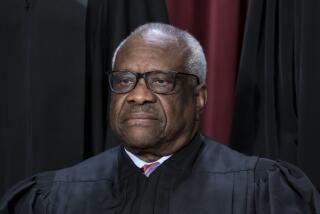17 Witnesses Roughly Split on Thomas : Judiciary: Opponents stress the high court nominee’s conservative views. Supporters emphasize his character and background.
- Share via
WASHINGTON — Black law professors from Harvard, Yale and Stanford urged the Senate Judiciary Committee on Tuesday to reject Supreme Court nominee Clarence Thomas, calling him “an eager spokesman for the agenda of the radical right.”
But a Roman Catholic nun who was Thomas’ eighth-grade teacher urged the committee to confirm the 43-year-old appeals court judge, characterizing him as an honest, committed and thoughtful young man who has “not forgotten his roots.”
So it went as the committee heard Tuesday from 17 witnesses who were roughly divided between supporters and opponents of Thomas, who wrapped up his own testimony before the committee on Monday.
The parade of witnesses has become an established ritual for the committee, but only two or three members bothered to listen to Tuesday’s testimony. Frequently, the senators interrupted only to remind witnesses to keep their statements to five minutes.
Stanford law professor Charles Lawrence said Thomas was nominated for the high court only because he “has demonstrated his loyalty as an Administration foot soldier” during the 1980s. Lawrence, along with Harvard Prof. Christopher F. Edley Jr. and Yale Prof. Drew Days, said Thomas made a name for himself in conservative circles as an outspoken foe of affirmative action.
Sister Mary Virgilius Reidy, who taught Thomas in Savannah, Ga., said he understands the injustice of racism because he experienced it. “He lived day by day the cruel story of discrimination,” she said.
One of the gray eminences of American law, 87-year Erwin N. Griswold, directly raised a topic that has been debated privately over the past week by lawyers who listened to Thomas’ sometimes stumbling comments about the law and past court rulings: Is he qualified to join the Supreme Court?
No, said Griswold, a former U.S. solicitor general and Harvard Law School dean, because Thomas “has not yet demonstrated any clear intellectual or professional distinction.”
“No one questions that Judge Thomas is a fine man,” he said. “But that does not support the conclusion that he has as yet demonstrated the distinction--the depth of experience, the broad legal ability--which the American people have the right to expect from persons chosen for our highest judicial tribunal.”
Because Thomas, if confirmed, may serve until the year 2030, the Senate would be taking “an awesome risk” by confirming his nomination, Griswold said.
Griswold was asked to compare President Bush’s nominee to William O. Douglas, who was appointed to the high court at the age of 40, or three years younger than Thomas. “In the case of Douglas, you are starting out with a really great mind,” he replied. “I don’t see any signs of corresponding scholarly intellectual ability in the present nominee.”
But Yale Law Dean Guido Calabresi insisted that personal character and a capacity for growth made for great Supreme Court justices, not pure intellect.
“None of the great justices of the past . . . came to the court fully formed. In the end, it was a combination of character, ability and willingness to really work hard and openness to new views that made them great justices,” Calabresi said. He described Thomas as an independent thinker who has changed his mind before and will likely do so again.
“His history of struggle and his past openness to argument, together with his capacity to make up his own mind, make him a much more likely candidate for growth than others who have recently been appointed to the Supreme Court,” he said.
More to Read
Sign up for Essential California
The most important California stories and recommendations in your inbox every morning.
You may occasionally receive promotional content from the Los Angeles Times.














